|
Posted by jessie.dazzle on
09-19-2006
|
Hello Romy and everyone here,
Thanks again for your thoughts on the large horns.
It seems best to start a new thread, as previous threads dealing with the "10-Footer" originally began as discussions of other subjects. Romy, you may want to move previous posts regarding the large horn to this thread as well (you can find them in the 5-Ch Melq, and Evaluation of Tractrix threads).
Quote from Romy : "...the 45Hz...should have a chamber of mach larger size, enabling to tune the driver for 80-90Hz. I know it sounds ridiculous to make a huge horn and waste it for a high crossover point. Still you might find it very beneficial for Sound. People usually do not do it (and I understand why) but you might experiment with it and you might discover then with "enough" space under crossover point the upper bass "might" sound very “opened”. You might go then to a lover crossover point by juts masking out the back chamber. It is hard to predict how high the 45Hz horn will be working..."
Contrary to what is mentioned above, when I calculate to tune the rear chamber volume for 80Hz, I get a SMALLER chamber volume than when I calculate for 40Hz. Beginner that I am, it is entirely possible that I'm missing something. In any case I understand that you mean to suggest tuning for 80 - 90 Hz.
I calculated rear chamber volume via the formula below (with throat area in square meters, velocity of sound in meters/sec).
Throat Area X Velocity of Sound
-------------------------------------
2Pi X Horn Cutoff Frequency
Formula available here (scroll down to "Compression Chambers", Second formula, as there are no T/S parameters for the AK151) :
http://melhuish.org/audio/horndesign.html
Is this an acceptable formula for REAR chamber volume calculation?
Regarding throat area : I don't have a question, but will post what I plan to use and leave it open for posssible comments. Though the AK151 is a 15 inch driver, the effective piston area measures about 11 inches (28 cm) in diameter. I took 2/3 of this dimension to arrive at a throat diameter of 7.33 inches.
Thanks in advance for any clarification/thoughts. Again, I hope one day to contribute back to this site with photo-documentation of the build process.
jd*
|
|
|
|
Posted by Romy the Cat on
09-19-2006
|
|
Jessie, 45Hz horn with 6”-7” throat around AK151 driver is from my perspective is the best thing might be theoretically built around a cone driver. I really envy of you and if I had room I would unquestionably go for it; this is why I keep a pair of AK151 and pair 15/40 in my storage.
Regarding the crossovers. You “might” need to cut off the LF that doing into the horn. Consider ~20Hez high pass, preferably line level. As far as low pass – it is very complicated subject. Of course everyone would like to get more LF out of LF horn and they drive it as low as the horn’s mouth allows. However, it is not necessarily good thing to do. You see, what I learned that all drives with back chambers (cone, compression… you name it) when they go down near their resonance frequency they become “congested” and not as relaxed and free as I would like them to be. I good solution is to let electrical filter to kill Sound before the diaphragm before stresses. Think this: a diaphragm dumping is good thing for mechanical calculation of suspension but a damped diaphragm is not a good transducer. Try to play any string instrument when you do not push a string strong enough to the deck – the string sound dull and subdued – exactly how most of the upper bass horns sound at thier lower knee. So, you would need to make your own conclusions where to cut it and how to use it. Do not forget that in your case many other variables will be playing: the boundaries gain, the room mode and so on…
Regarding the back chamber. When you lower back chamber it rises resonance frequency. Some people try to drive resonance frequency to the horn rate; some would like to be having the resonance frequency below the horn rate. I do not think that any rules might be in there. You have to listen how your given horn will behave and sound in your room. I can assure you that the level of freeness of the cone of this driver will be very-very much describing the sound you will be getting out of this horn. It will take for you a few weeks to play with it when you will be done. It is very interesting to change slightly the depth of the hermetic-ness of the back chamber and to see how sound from the horn will change HUGELY. I would say that a good staring point would be look what Vitavox did for their System 191:
http://website.lineone.net/~empson/Sys191.html
Find plans and see how they use the AK151 (chamber), then compare with your circulations… I would go for 1.2-1.4 times larger chamber to have some spare space. It is always possible to patch it with none-elastic foam and to make the chamber smaller…
Also, Jessie, there is another very important point. A construction of your systems should not be a pure DIY efforts or it will be just another stupid DIY project. Your should have none-DIY objectives and use those horns to resolve those none-audio objectives. You need to clearly visualize the result, to breed the result within yourself. Try to listen and to understand Sound that your horn does without even connecting the horn… The moronic DIY people always miss it and end up with garbage result but the problem is that they do not know where they are doing. Good result come to people who are ready to recognize good results and you have to train and evolve own perception and understudying of Sound in order to be able to acknowledge and discriminate the result when and if you get it from this big new horn. Without an evolvement of own awareness any DIY project is juts a pile of stupid activity resulting with typical nothingness… Try to develop some “leading” interests in music and build this big horn to fulfill this “leading interest”…
Rgs,
Romy The caT
|
|
|
|
Posted by Romy the Cat on
09-20-2006
|
Here is a picture of my upperbass horn’s back chamber. The actual chamber is approximately twice smaller as it patched internally with construction foam (a wonderful John Hasqiun invention). The dust cap of the driver is where the weight is hangs down...
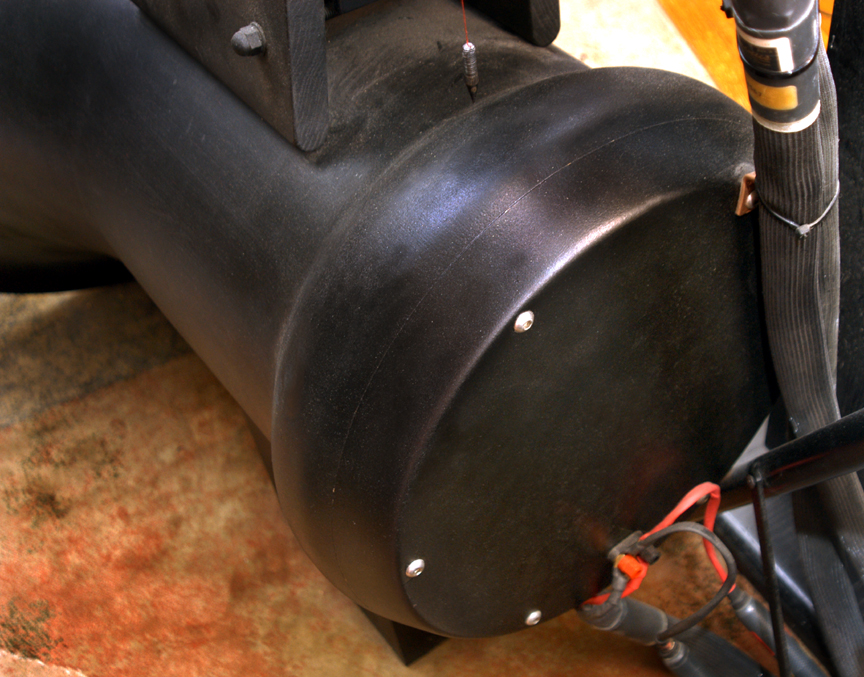
|
|
|
|
Posted by Wojtek on
09-20-2006
|
Also, Jessie, there is another very important point. A construction of your systems should not be a pure DIY efforts or it will be just another stupid DIY project. Your should have none-DIY objectives and use those horns to resolve those none-audio objectives. You need to clearly visualize the result, to breed the result within yourself. Try to listen and to understand Sound that your horn does without even connecting the horn… The moronic DIY people always miss it and end up with garbage result but the problem is that they do not know where they are doing. Good result come to people who are ready to recognize good results and you have to train and evolve own perception and understudying of Sound in order to be able to acknowledge and discriminate the result when and if you get it from this big new horn. Without an evolvement of own awareness any DIY project is juts a pile of stupid activity resulting with typical nothingness… Try to develop some “leading” interests in music and build this big horn to fulfill this “leading interest”…
Rgs,
Romy the Cat |
|
Yeah, Very true but also difficult and long, painful process. Finally I think I know what I want. The problem is that I don't have time resources and knowlege to get there. With my limited comprehensive skills I tried to navigate trough this site for a several months now . Everything became much simpler after purchase of seasonal subscription (finally) to Symphony Hall .Funny how many people say it but I really wonder how many people who "do" audio listen to life music.If they do, how they say they do I must have an alien ears. (I heard that some audiopholes don't like to go to classical performancess because their gear just SOUNDS BETTER) I know that it is truism but there is no vocabulary to transfer the experience and all this mine , Romy's and others "Eskimo poetry"as elaborate as it can be just scratches the surface of personal experience . I still don't understand how playback system at home can trough different perceived (?) qualities stimulate similar to life music emotions.Either I missed the post or did not comprehend it could you elaborate more on this Roman?? Maybe thats the key to success. Also still there is a problem with recognizing "the problem" And finally it became painfully evident that in most DIY installations people just put in the play whatever crap they have in hand and after that try to justify (or defend) their choices or build philosophy around it and I tried that too (defend & justify) and the best I could come with was ,well it was cheap or I already had the junk in my hand ,and yes I was wrong in some of my stupid posts.I'm really sorry. Rgrds, W
|
|
|
|
Posted by Romy the Cat on
09-20-2006
|
 Wojtek wrote: Wojtek wrote: | | I heard that some audiopholes don't like to go to classical performancess because their gear just SOUNDS BETTER |
|
There are many very reasonable explanations of this sentient. I do not go in there as it is what of the subject of this thread.
 Wojtek wrote: Wojtek wrote: | | I still don't understand how playback system at home can trough different perceived (?) qualities stimulate similar to life music emotions. Either I missed the post or did not comprehend it could you elaborate more on this Roman?? Maybe thats the key to success. |
|
I made a point a few months back replying to somebody that audio and music at a certain level are not related. Although it immediately sounds for an ordinary audio person as the typical audiophile heresy but there is a LOT of more behind the differentiation audio and musical context. It is way more complex topic then it might immediately appear. Audio is a stand alone subject and nothing else. It should be view as a stand alone subject
 Wojtek wrote: Wojtek wrote: | | Also still there is a problem with recognizing "the problem" And finally it became painfully evident that in most DIY installations people just put in the play whatever crap they have in hand and after that try to justify (or defend) their choices or build philosophy around it and I tried that too (defend & justify) and the best I could come with was ,well it was cheap or I already had the junk in my hand ,and yes I was wrong in some of my stupid posts.I'm really sorry. |
|
Stupid of not your post was is irrelevant. What is relevant is that it is reasonable subject but in the very wrong thread. I have very little rule on my site, if any, and one of the few know to me rules is that posts in the thread should be in some way bind to the subject of the thread. Let keep it this way.
Still, I intentionally injected into my reply to Jessie the subject of above-audio objectives because without it the definition of success will run through the fingers like beach sand. I sincerely hope that Jessie, or anyone else would recognize that building a high capacity playback installation should be affinity with development of evolved reference points, civilized methods of playback assessments and original objectives in classical music. With it all those attempts are not real audio but just a habitual self-entertainment – exactly what the Morons DIYesr do.
Rgs,
Romy the Cat
|
|
|
|
Posted by jessie.dazzle on
09-23-2006
|
Thanks for the recommendations on crossover points and the image of the rear chamber on your Upper Bass horn...
I've been back into some virtual modeling of this large horn (having made one quite nice MF horn, I've proven to myself that I have not forgotten how to work with the materials involved, and am now permitting myself to go back into the virtual world a bit)... Today I built a reasonably accurate CAD model of the AK151, and then around it, I constructed a rear chamber having a volume tuned to 80Hz. And... Interesting coinsidence... It turns out that the smallest cylindrical volume which will contain an AK151 works out such that the chamber is tuned for 45Hz, which matches the Fs of the driver. Raising the tuned frequency as you suggested, can be achieved by introducing a solid to this volume... Probably in a ring-shape in the area around the magnet.
I should not have to push the 45Hz horn too low, as I will cover the really low notes via a pair of subs based on the McCauley 6174 (which I will add once everything else is dialed in).
As for clearly visualizing the result... I have no trouble at all seeing it.... Hearing it ahead of time, well now... not so sure what I imagine is what I will get, but as a matter of fact, I do have an imagined and internally audible result. Also, this may sound silly, but I could already hear something I really liked in the driver without the horn... some sort of texture to the sound that I can only associate with the tone of my parent's C. 1960 tube driven console-type stereo... the big cabinets everyone used to have back in the day.
Regarding leading musical interests and understanding... I am evolving this all the time... which is somewhat facilitated by living here.
Next step is to finalize the way this horn will be assembled (has to be done it parts, which have to fit in the elevator).
Thanks again,
jd*
|
|
|
|
Posted by Romy the Cat on
07-19-2007
|
|
Here is an interesting, atypical nowadays, attempt to get 45Hz. With massive (not plywood construction), use one diver instead of two drivers, use better drivers and with proper tuning of the back chamber (it is wrong there) it might be a good solution. Ironically this horn semi-uses some of my ideas that I came up while I was playing with “resonating oops”....
http://cgi.ebay.com/Altec-Vintage-Bass-Horns_W0QQitemZ110150740342QQihZ001
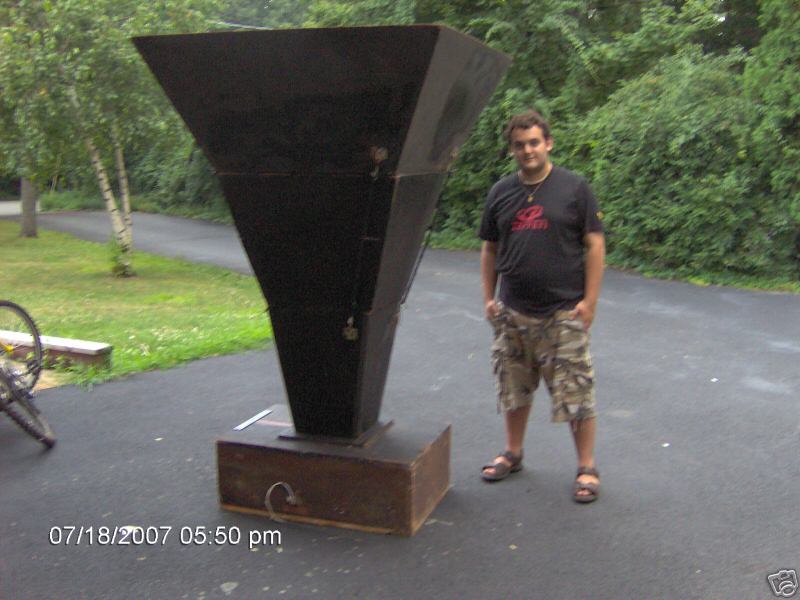
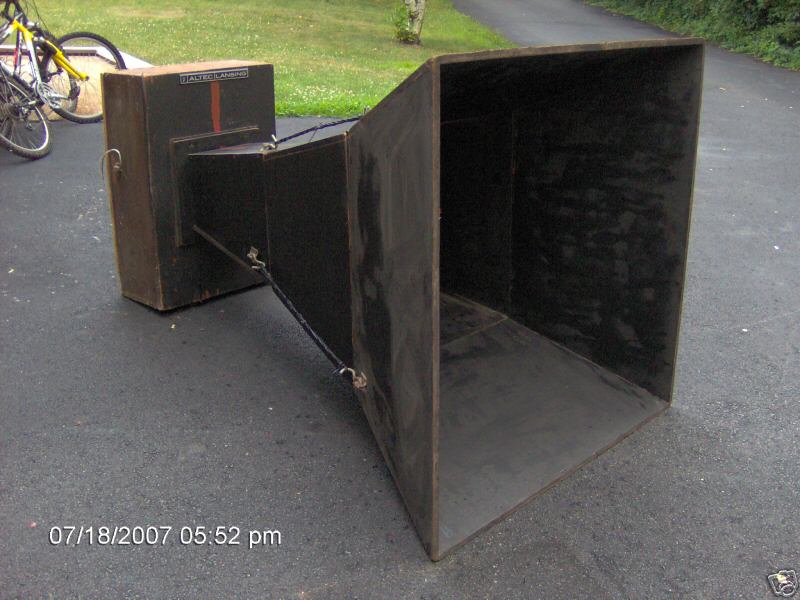
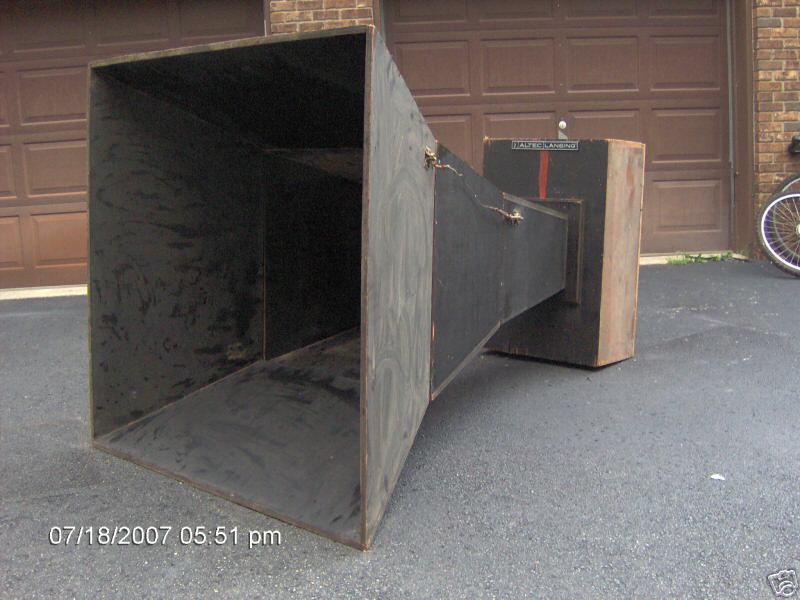
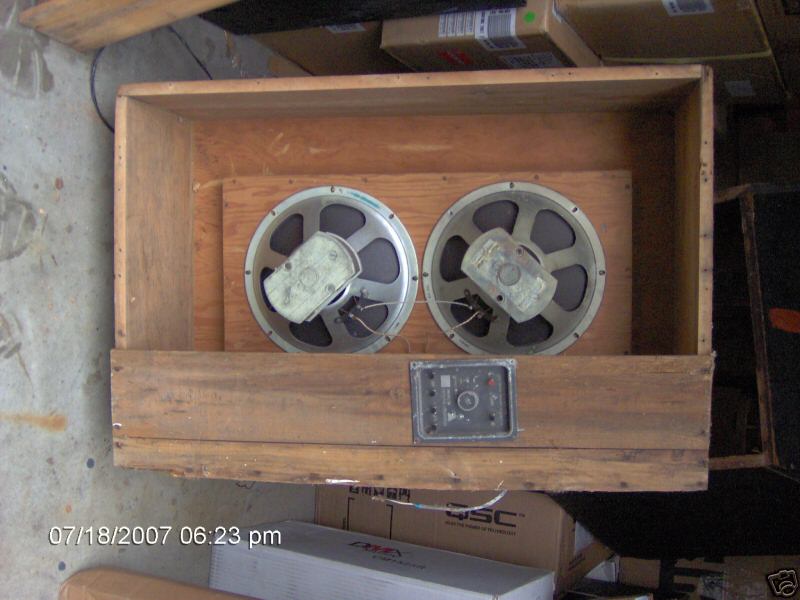
|
|
|
|
|
|
|
Posted by Romy the Cat on
09-14-2007
|
 Romy the Cat wrote: Romy the Cat wrote: | |
“Hi! I have built this horn at the bottom of the page
http://www.GoodSoundClub.com/TreeItem.aspx?PostID=4984
It actually goes down to 20 Hz, but from 30 Hz it has full output. Why don´t you like either Hornresp or our project? Is it because the front chamber? the driver we used? Wrong design? Or what? We built this horn to the other guys "Student-club-house", don´t know what it´s called in english... They allready had 2 drivers, Beyma 15K200, and said to us to build a subwoofer, well, a ported box aint much fun and very inefficient, therefore the horn. The horn allso had to be portable and light weight, not easy if you have 5 sqaremeters mouth... So therefore the relativly large front chamber, it helps the horn to dig deeper and allso to prevent higher frequenses (spell?) from wall resonanses to be amplified by the horn. The final result became very nice. It delivers a really tight bass and can play so loud that galss is falling off tabels. The romm is aprox. 10*25*10 meters and the horn is attached in a crane. With disco-music, which it is designed for you dont hear walls shatter, but if you are going to listen to metal or so with higher bass there are some resonanses due to wall vibrations. On the orher hand, the horn (without the box) weight only about 200 lbs... Feel free to post this message in the thread "45 Hz Horn" if you like.
Regards Petter Persson, Sweden”
|
|
|
|
Posted by Romy the Cat on
05-18-2008
|
|
Discussing the Jessie project we multiple times mention the idea of the large midbass horn handing above MF section. Where else the 7”-9” might be positioned? The rational was to have it positionally contra-react the output of the upperbass horn. It is all good and it is what I would do in context of Macondo alternation is I have space but do we automatically assume that the hanged horn would be a flimsy horn?
Well, among a few midbass 50Hz that I was exposed I heard today one that I actually like. It was a straight 50Hz, hyperbolic, rectangular, with two 12 inchers loaded into 6” trout each. I do not know the specifics of design but the wall are wood-sand-wood and they are 2” thick – good construction and … you would never hang this time of the horn.
The midbass horns were positioned outside the MF channels, time aligned with mouths extended far into listening position. It was running 50Hz to 800Hz and despite I would have some objection to this configuration but the midbass of the installation was quite pleasant. I would leave aside and opened the question if the midbass might be better even in connect of THAT installation but the brief listening of that playback suggested some thoughts.
How high we can go with midbass horn? As far as the driver allows? As far as other solution would not defeat the midbass horn in term of quality? As far as other horns we do not want to build? There is no answer but this thing should be well thought. Yeas the use of midbass horn as the only horn the sit on the ground is a good idea but it lives the space under the MF channels empty and slightly increase the minimum integration distance. Still it looks like it might be worked out or at least attempted.
Rgs, Romy the Cat
|
|
|
|
Posted by jessie.dazzle on
05-19-2008
|
|
Romy's quotes in blue :
"...Discussing the Jessie project we multiple times mention the idea of the large midbass horn hanging above MF section... The rational was to have it positionally contra-react the output of the upperbass horn... But do we automatically assume that the hanged horn would be a flimsy horn?..."
Well... Apart from really slowing progress on this project, the move to a new "house" means that for as long as I stay in this place (???), I too will be placing the bass horns (45 Hz) down at floor level, outboard of the main left and right channels.
"...The midbass horns were positioned outside the MF channels, time aligned with mouths extended far into listening position. It was running 50Hz to 800Hz...How high we can go with midbass horn?..."
I will admit that in the case of the smaller upper bass horns (10" driver into 115 Hz horn) I have recently been letting them run with either a high-ish cutoff, or no cutoff at all, other than that which naturally occurs due to the architecture of the driver/horn combination. This is in the interest of increasing output down low, as a coil tends to choke output way below the cutoff frequency (6dB/octave). I am wondering if the decision to let a 50 Hz horn play all the way up to 800 Hz (see previous post) was not made in order to get enough volume out of the horn further down.
"...but do we automatically assume that the hanged horn would be a flimsy horn?..."
As for construction of the 45 Hz horns, the plan allows for hanging or placing down at floor-level... The horns will not be flimsy... Construction will be as follows : Everything down stream of the driver mounting plane will be from glass fiber laminations. These will be true round-section horns... Not so much for sound, but because I am lazy and want to make the horns from as few segments as possible; the compound curvature involved would be more rigid than single curvature construction for the same mass and number of segments... Anyway, given the process it does not entail much more work. Additional stiffening ribs can be molded into the outer surfaces. There would be eight identical laminations to make (four 90° segments per horn). I absolutely hate working with glass fiber, but given my resources and objectives, it makes the most sense (it will mean checking into a hotel to sleep while the resin cures, as I just can't afford additional brain damage). Horns made this way should not be too heavy to suspend if one day I find the right room... Which brings up another of my objectives, this installation must be mobile; a two-man job at max, and all the pieces must fit into a standard 2m-wide sea container. Rear chambers would be one-piece bolt-on castings made via a process similar to that used in the construction of the smaller horns.
I will soon have no excuses for putting off the construction of these horns, as I have finished everything else; the frames which locate the other horns are finally done (still need to paint them), they were a lot more work than I expected. I swear I will post photos soon.
jd*
|
|
|
|
Posted by Romy the Cat on
06-10-2008
|
|
I was thinking about a space-economical way to arm playback with midbass 50Hz horn. It is not that I am into it myself but conceptually I was wondering how to put all of necessarily things within a minimum compromise in minimum footprint. I came up with following:
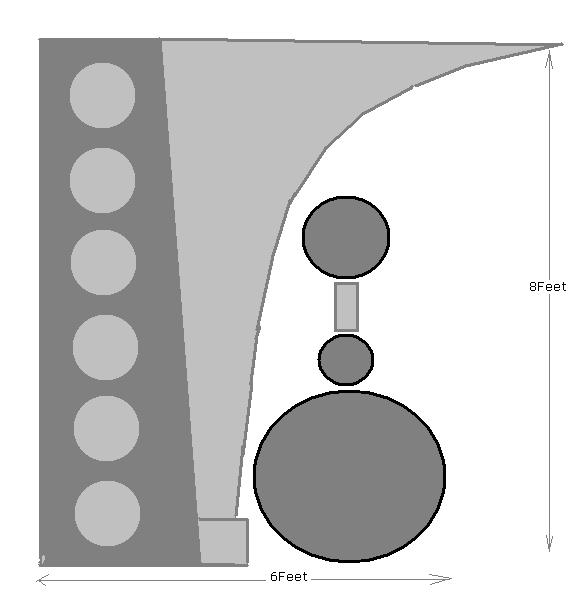
The configuration has time delay from midbass horn. It is a big fault, terminal fault in my book but it is what it is. I did not try it but it would be very easy to model this behavior by running my injection channel in midbass region at 0dB with ~11mS time delay. The Cat
|
|
|
|
Posted by decoud on
06-13-2008
|
|
Annoying, is it not, that it is precisely at the low frequencies that synchrony matters most.
|
|
|
|
Posted by cv on
06-13-2008
|
Romy,
I'm not sure how "transparent" you find the Lavry etc AD/DAs, but since you have them, it might not be difficult to throw in an adjustable digital delay; eg these chips from TI
http://focus.ti.com/paramsearch/docs/parametricsearch.tsp?family=analog&familyId=932&uiTemplateId=NODE_STRY_PGE_T&familyAliasId=1200932¶mCriteria=no
There are evaluation boards with differing features (on board DA etc which you wont need) available too; if you can provide I2S interfacing and live with fixed delay in units of 256 samples, then the TPA5052 chip is very easy to use; I2S in, I2S out and 5 bit delay selection input. If the I2S is an issue, I'm sure there are interface ICs that will do the trick.
It extracts a clock signal from the input data so hopefully won't introduce too much jitter.
Cheers
cv
|
|
|
|
Posted by Romy the Cat on
06-13-2008
|
|
Chris,
The point of digital delay is well taken. Digital has no problems to delay and if someone had only digital as source then it is very simple to use tow parallel DACs and to stick temporary storage memory in one or them. In case of multiple sources and the need to delay not the bass horn but the full-range bandwidth the situation is grimmer. What I would like to see is a small box with AD/DA from a common clock and time delay between. There was many unit made in 80s for pro audio but none of them where up to the level of true transparency. In today would it would be possible to have 32bit/381K on few chips and a powerful buffer. Unfortunately there is no market for a such a devise and high-end level of performance and transparency. It is very unfortunate as it might be a very useful tool.
Macondo does not need a time delay. Even if I personally go with Macondo for 50Hz horn then it will be only positioning-align and I will not use any artificial aligning methods.
The Cat
|
|
|
|
Posted by jessie.dazzle on
06-19-2008
|
I've been thinking; rather than placing the mid-bass horns off to the sides or above the rest of the horns as in the first two images below (a CAD model of the horns in my new place); a plan which implies accepting imperfect time alignment...
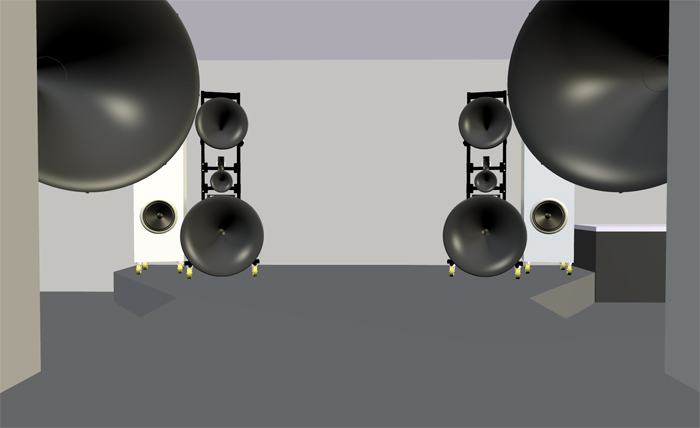
Original idea for setup as seen from the listening seat
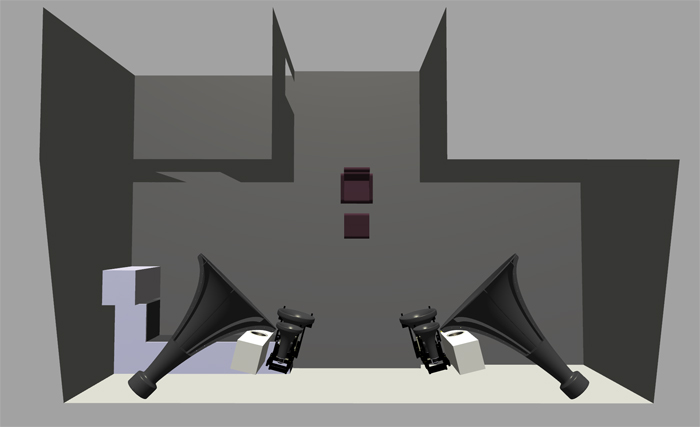
The same set up, as seen from above
(the thing at which the horns are aimed is a chair with footrest)
If space allows, why not try placing the mid-bass horns behind the listener as in the following image?
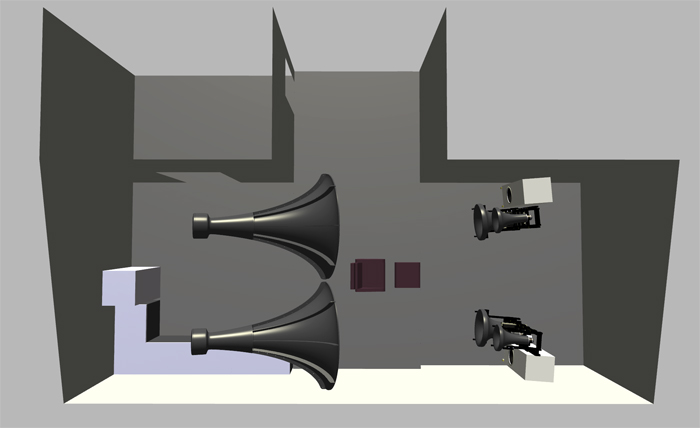
Mid-bass horns located behind listener; main horns in front
Since all drivers are located the same distance from the listener's ears (in the case of the mid-bass horns, the distance is to the rear), this would permit time alignment without obscuring the output of the smaller horns. In the case of a 45 or 50Hz horn, it is likely that the output would be between 90 and 250Hz. The big question is of course would the point of origin of this output be perceptible, and if so, would it be problematic if perceived as coming from the rear?
Any thoughts?
jd*
|
|
|
|
Posted by Romy the Cat on
06-19-2008
|
|
Jessie,
Unfortunately it is in my view it is absolutely imposable to predict anything juts based upon the CAD modeling. The entire criteria that you for founding the right positioning of your instantiation are wrong, at least in my view. You use the consideration of time arrival, esthetics, light of sight, localization… Do not get me wrong – they are very important criteria but there are even more essentials criteria – something that overrides everything and something that will dictate to you how and where your installation will be organized. Truest me, you will not have a lot of chooses if you will be using the right criteria. From there you will use the rules of time arrival, esthetics, light of sight, localization etc but it will be in a given framework, the only framework that your room will dictate.
In my view you will hit two major aspects, answer to which will dictate how to position your playback. The very first will be something that I described in the “About speakers Imbedded Macro-Positioning” article:
http://www.romythecat.com/Forums/ShowPost.aspx?postID=4421#4421
Fist: The midbass big horns would have over 10dB difference between being imbedded in the room hot spot and placed somewhere else. In the “hot spot” the midbass horns will load the room in a manner that shell make to stop even thinking about other location for the channel. Everything else will just flow from the only positioning of the midbass horns.
Second: the LF channel. In your room you need to measure what your LF channels outputs. You might position them between the midbass the MF horns tower of your might put then outside of the midbass – you never know. If you cross then at 30Hz-40Hz for instance than in one spot it might more or less evenly load the room, in another spot it will have plus or minus 12dB somewhere. If you do then it is imposable to cure anything besides just moving the woofers 3-5 meters away to a completely different location. Usually sane size rooms have those bass suck outs and influxes at 50Hz -100Hz – you with your hypothetical 30Hz-40Hz crossover will be beyond this level. Still the woofers might hit you with problems with their tail response. Do not take out of consideration the opportunity for lower bass channel to work TOGETHER with midbass horn. You might accomplish it by crossing the woofers at 100Hz for instance. Let patent that your naked woofers have 95dB flat from 200Hz to 50Hz and then at the bottom then have in a given location a huge boom of plus 12dB from 50Hz to 25Hz. Why to fight with it if you can use it: you might declare the 107dB of the sub 50Hz and the woofer new reference sensitivity, crossing the woofers at 100Hz and letting the woofers to run 12dB behind the midbass.
The point I am trying to make is that the actual measurement of the footers, midbass and partially the upperbass will dictate where to position the system. When you found the strategic positioning then you can go for tactical positioning. For instance the MF island will “read” the proximity to the back wall and you will curves the leading edge of imaging accordingly – you will play with those details lately…
Anyhow, I do not think that an abstract CAD modeling might say anything indicative. I have somewhere else in my site somebody was asking about the specific positioning of speakers and I was very none-cooperative. It was not an accident and not my desire to be a jerk. The proposer positioning is an ability of the system owner to assess the results and to react to outcome. I think having any precompiled concepts in this is not a good idea. I am sure, you Jessie, will find the way how to load you room with speakers. In the end do not forget the following:
http://www.romythecat.com/Forums/ShowPost.aspx?PostID=2553 The caT
|
|
|
|
Posted by Romy the Cat on
11-18-2008
|
|
fiogf49gjkf0d Try this:
http://www.realhorns.de/index.html
and then keep clicking it until you get this
There is some text in there with data, I can’t read German but I do like the shape of this thing. I particularly very much like the idea (I do not think that Germans use it but it came to me when I saw the Cow Horns) to make the mouth from a relatively light and resonant material but then to have that bungy cord in the peripheral of the mouth. By straightening the bungy cord it might be possible to press the leafs of the mouth and to dump them, effectively controlling resonance. If I will be making my 50hz horn I would most like would do something in this direction, only with smaller throat.
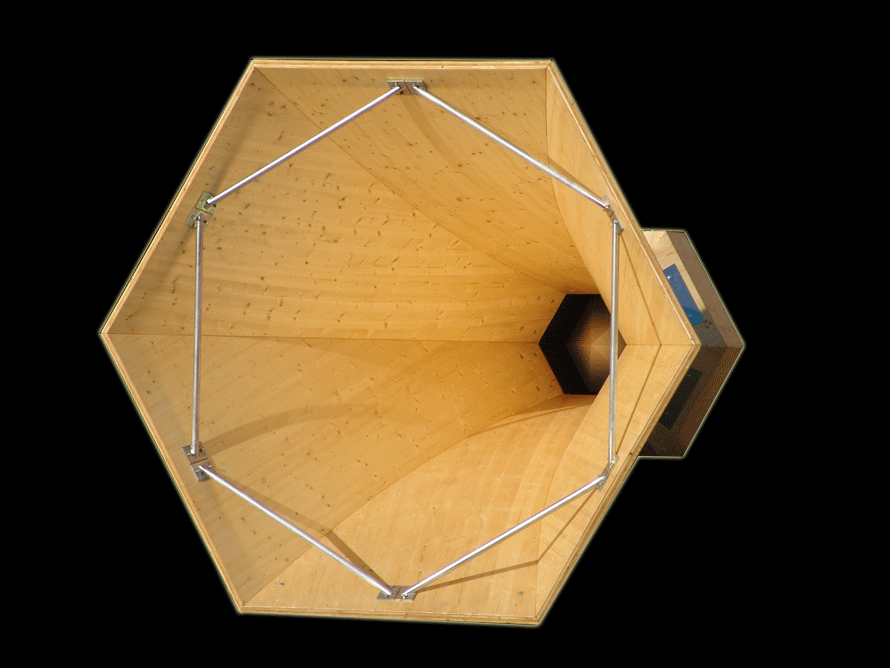
I see in fact a second row of cables inside, at half space, where running the cable and effectively minimizing the cable length it is possible to stress the force applied to horn and to tune the horn… like piano…
The Cat
|
|
|
|
Posted by jessie.dazzle on
11-19-2008
|
|
fiogf49gjkf0d Wow, 6 x 15" drivers (!!!); though the curved profile certainly imparts rigidity, I'm guessing this horn must resonate more than a bit (no bracing until the mouth) -- but I like this thing.
Interesting, the phase plug-like device in the center.
If ever traveling near these people I will definitely try to arrange a demo.
About the idea of harnessing and trying to "tune" resonances... It reminds me of the "argument" that a flexible automotive chassis has merits (yes, perfect if you wish to "confuse" the suspension and fatigue the occupants! Never mind, I'm starting to sweat). I know, horns are not cars; apples and oranges etc.
In any case, my instincts tell me that energy would be more properly channeled by allowing the excited medium in the horn (the air) to "work off of" a solid foundation (Ever stand on the top rung of a ladder and try to hammer in a 10-penny nail?). Also, I don't like the idea of a driver working in the presence of a secondary source of excitement, regardless of its phase; in this case, air in the horn re-excited by resonating walls, causing pressure to feed back to the driver (An exaggeraton : The pulsating pressure one feels when speaking into the rear of a fan) But this all just theory.
Though I may be wrong, this is why I went the other rout and used a material that is really dead and heavy with loads of bracing.
jd*
|
|
|
|
Posted by jessie.dazzle on
11-19-2008
|
|
fiogf49gjkf0d jd wrote :
"...my instincts tell me that energy would be more properly channeled by allowing the excited medium in the horn (the air) to "work off of" a solid foundation..."
On the other hand, I'm now thinking of a trampoline, and how it can amplify the trajectory of a body... Uh hang on... Back to the first hand... This brings to mind the time I tried walking during a fairly serious earthquake, or trying to write a letter while riding in a car... Without building the physical prototype, its just a guess what the result might be, and that result might be turned/tuned to an advantageous effect.
jd*
|
|
|
|
Posted by Romy the Cat on
11-19-2008
|
|
fiogf49gjkf0d  jessie.dazzle wrote: jessie.dazzle wrote: |
Wow, 6 x 15" drivers (!!!); though the curved profile certainly imparts rigidity, I'm guessing this horn must resonate more than a bit (no bracing until the mouth) -- but I like this thing.
Interesting, the phase plug-like device in the center.
If ever traveling near these people I will definitely try to arrange a demo.
About the idea of harnessing and trying to "tune" resonances... It reminds me of the "argument" that a flexible automotive chassis has merits (yes, perfect if you wish to "confuse" the suspension and fatigue the occupants! Never mind, I'm starting to sweat). I know, horns are not cars; apples and oranges etc.
In any case, my instincts tell me that energy would be more properly channeled by allowing the excited medium in the horn (the air) to "work off of" a solid foundation (Ever stand on the top rung of a ladder and try to hammer in a 10-penny nail?). Also, I don't like the idea of a driver working in the presence of a secondary source of excitement, regardless of its phase; in this case, air in the horn re-excited by resonating walls, causing pressure to feed back to the driver (An exaggeraton : The pulsating pressure one feels when speaking into the rear of a fan) But this all just theory.
Though I may be wrong, this is why I went the other rout and used a material that is really dead and heavy with loads of bracing. |
|
I did not know that they use 6 x 15" drivers. This is what the big mouth comes from. To use many drivers is obviously not a chose. Looking at the midbass horn of other I constantly try to nails down what I would do if I go there. This horn is a nice illustration on my view. What I change? Obviously a single driver with 7’-8” throat. Use 7 sections instead of 6 sections. His would get rid of semi-parallel surface in horn, allows the horn to have much better coupling to side walls and eliminate an sharp angle on another horn’s side that in the case of 6 section would vignette the MF channels.
It is unquestionably that to use of dead and heavy material with lots of bracing is the way to do if there is an opportunity to do so. I question is there is another opportunity. Let pretend that we have heavily built 50Hz from 7” to 9’ form made from “dead and heavy material”. We are talking about a more or less permanent setting with each horn be let say 300kg-400kg or perhaps even less. Now let pretend an alternative version. We have the back chamber and the first 2-3 linear feet made “heavy” (let call it “base”) and then we have detachable, relatively light 7 leaves attach to the base. The 7 leaves might be made from wood of 3/4-1”” or architectural plasmas, or whatever… The leaves have little and accurate handled that extended inside of the horn and the through those handled we have tightening cables going. It might be one cable/cord/rod or isolated cables, I have no idea but the concept is that tightening the cable we have a change to dynamically compress the horn’s leaves.
Pretend we made the horn, installed it where it shell sit, let pretend that it is 50 to 180Hz horn. Then we take a sweep generator and begin to sweep the home, looking for the resonances. In this case we can objectively pick the resonances with stethoscope but we can also to evaluate how those resonances impact the auditable sound from the horn. Theoretically by tightening the cables/cords/rods it might be possible to manage resonances and to move them around, shaping up how the horn might response to sound. BTW, I have no idea if the concept would work but I do not see why it would not. After all the musical instruments are very light and the keys in them is not mass but well-managed propagation of resonances. It however very much might not work for reproduction purpose.
The Cat
|
|
|
|
Posted by Romy the Cat on
11-19-2008
|
|
fiogf49gjkf0d  jessie.dazzle wrote: jessie.dazzle wrote: | | … This brings to mind the time I tried walking during a fairly serious earthquake, or trying to write a letter while riding in a car... |
|
Actually it is very good association. In Zaratustra amplifier bias was made by the very same concept. It was the Newton's Laws of Motion in action. The similar idea might work in tuning bass horn. We can look even beyond that.
Back in my youth I was studying design of railway locomotives and I remember that they had one devised that highly attracted me – the antivibrator. Let live aside how and why it was used on locomotives and let to apply the same ides to our lightly-made midbass horn. Keep it not as the real pros but rather as brim-attack.
We have 7 light segments of the horn and they resonate, individually and together. In the end of each segment we hard-bolt the Aurasound’s Bass Shakers:
http://www.aurasound.com/public/bassshaker/frameset2.html
Each Bass Shaker sits begin some EQ, volume control and phase switch. Now we can do with the resonance of out horn whatever we wish… make horn form very cheap and light material… Theoretically, if it works then it open a new whole outlook at the “pain” of midbass horns. BTW, this idea I was playing with while I was thinking about my “Resonant Oops” concept…
The Cat
|
|
|
|
Posted by Paul S on
11-19-2008
|
|
fiogf49gjkf0d Jessie, I agree in spades. You could play around trying to "tune" that thing for the rest of your life.
But then, who is going to hear serious problems with something that was such a pain and expense to build and install?
More likely is that anyone who got that far would either hear it as "successful" or they would, indeed, continue futzing with the thing into dotage.
OTOH, better to wind up with this a dud than to have one end of the house cast in bad-sounding concrete...
I'm going to light a candle, right now, for all the giant horn builders out there...
Best regards,
Paul S
|
|
|
|
Posted by Paul S on
06-13-2010
|
|
fiogf49gjkf0d
Mining the site, as I often do, I turned up a link to this thread.
Anyone thinking of horn LF right now, please take a look at post #7, this thread. This is, according to my experience, the quintessential "home brew" "LF" horn. Need I say more?
People, this is no "gimmie"...
Paul S
|
|